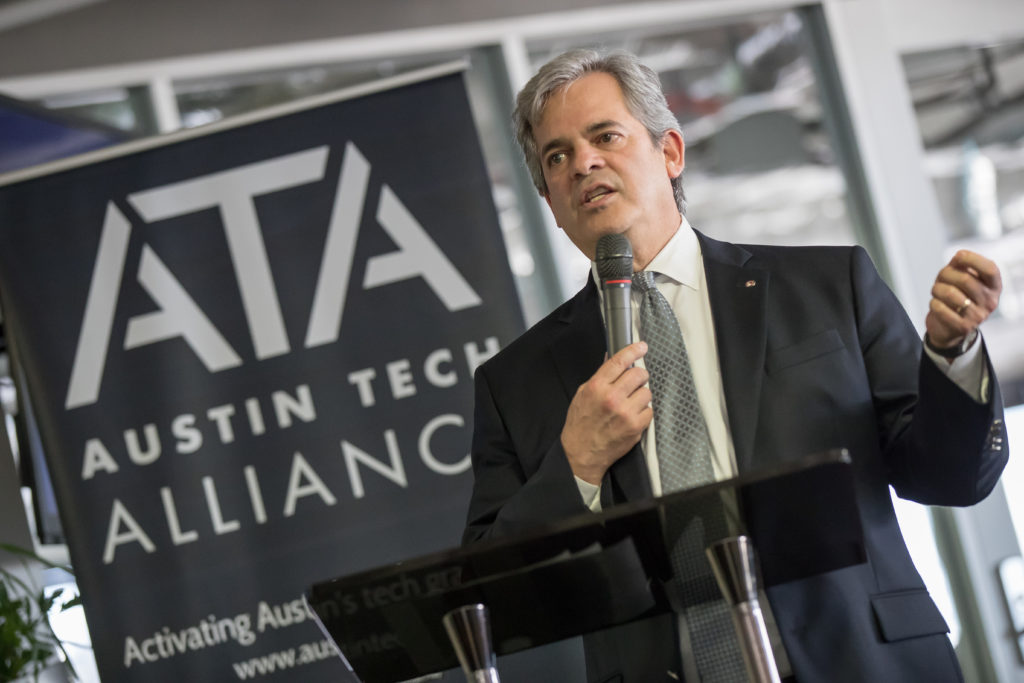On Wednesday evening, Austin Tech Alliance hosted a public discussion about CodeNEXT with Mayor Steve Adler, representatives from the CodeNEXT team, and a panel of community leaders — Niran Babalola (AURA), Andy Cantú (Austin Chamber / Evolve Austin), John-Michael Cortez (Mayor Adler’s office), and David King.
CodeNEXT is Austin’s ongoing effort to revise the city’s Land Development Code, regulations that determine how land can be used throughout the city — including what can be built, where it can be built, and how much can (and cannot) be built. Wednesday’s event was an effort to educate Austin’s tech community on the topic, an essential first step to being an active participant in the process.
Community Impact’s Christopher Neely provides good coverage of the conversation, but here are three quick takeaways:
The future of affordability is at stake
If Austin wants to avoid the path of crippling unaffordability that other tech hubs like San Francisco, Silicon Valley, Seattle, Boston, and New York City suffer from, CodeNEXT is the community’s best opportunity.
Mayor Adler explained it as follows:
“If we don’t do anything in this city, if we didn’t build anything else or change any of the rules, we know we would be a city with $1.5 million two bedroom bungalows. We would have gentrification, and we would never be able move around the city. Housing prices would continue to move up four times faster than incomes move up, which is what we’re having right now. CodeNEXT is the tactical plan that enables us to get from where we are to the vision of the city that we want to be.”
Community advocates recognize this, too. As Phyllis Snodgrass, CEO of Austin Habitat for Humanity, writes: “We, as an organization, believe that affordability can be more than just a pipe dream — it can be a reality by adopting smarter policies. CodeNEXT can be the next monumental change for Austin.”
Niran Babalola, a product engineer representing AURA on the panel, made the case that CodeNEXT’s opportunities extend far beyond affordability:
“People are blaming the tech industry for the problems we’re seeing with affordability, as if having people who are coming in and creating things is something we should stop —that we should have less jobs, that our economy has won so much that we’re tired of winning. Instead, what we need to decide to do is have inclusive neighborhoods, [so that] who lives in a neighborhood is defined by what kind of people choose to live there … That’s the kind of Austin we can be. All we have to do is choose it, get involved, and demand it — because that’s the Austin we deserve.”
Not just buildings
CodeNEXT deals with more than just buildings: the environment, water quality, and flooding are all impacted by updates to the Land Development Code. As Greg Guernsey, director of the City’s Planning and Zoning Department, said:
“It’s our watershed regulations that deal with water quality. It’s our drainage regulations about how we detain water so we’re not flooding neighbors downstream. It deals with transportation issues, landscaping, signs — it’s a virtual smorgasbord of things that touch our lives everyday, whether you rent or own, whether you live in a high rise or in a garage apartment. It will touch you as you go to work, as you come home, and as you shop.”
Get engaged
The draft code was released at the end of January, and it’s available for public review and comment. The next big step is the April 18 release of the zoning maps, allowing Austinites to see how the draft code would apply across the city.
If you’re looking to get more involved in the creation of CodeNEXT, here are a number of organizations that are diving deep into into the topic. Many of those groups were represented on the panel, including AURA, Evolve Austin, and neighborhood associations.
But keep in mind that the wheels of government often turn slowly and react to politics much more than a tech crowd might like. Mayor Adler said as much: “I am speaking here to a tech group, and I know this is a group that is generally data-driven. You are walking into a process that is consensus-driven, so we need to bring the best of both of those worlds to bear. You guys are all about innovation and creativity, and we are all about consensus in the government.”
Hungry for more? Watch the entire discussion:

